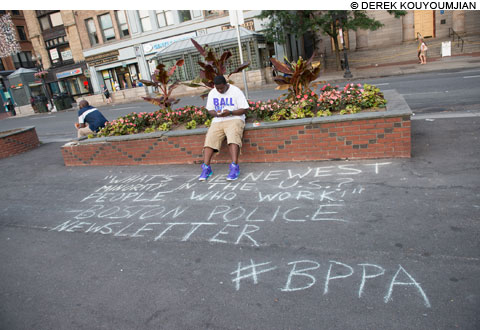
GETTING THE WORD OUT Someone chalked a choice quote from the BPPA newsletter on this Boston street. A closer look at the union's financial dealing show that troglodytic sentiments may be the least of its problems. |
The Boston Police Patrolmen's Association paid hundreds of thousands of dollars to a fundraising agency run by a woman who once bilked businesses out of money for a fake charity — by impersonating a police officer.
Commonwealth Productions, LLC, based in Braintree, was incorporated in 2006 to provide "fundraising . . . excluding 'charitable solicitation'" for the BPPA, though the BPPA's financial records list it as an "advertising" expense. The company was dissolved by the state last year for failing to file returns.
Donors who contributed money to the BPPA while Commonwealth Productions was in operation said they were told they were supporting a scholarship fund for children of police officers. But the BPPA's financial records show that almost none of the money raised went to scholarships — and that in fact, the bulk of it went into Commonwealth Productions' pockets.
The company was operated by Lisa Hutchinson. In 1991, a Suffolk County grand jury indicted Hutchinson, her husband David Gargano, and seven others — including three Gargano family members — for allegedly scamming businesses out of nearly $200,000.
The specific charges? “The nine posed as police officers or firefighters as they made the rounds of small businesses, seeking donations to help with drug education programs, police relief efforts and fire safety training,” a Boston Globe reporter wrote at the time.
In its 1993 yearly report, the Attorney General's office wrote of Gargano as a "ring leader of a fraudulent fund-raising group." Gargano and Hutchinson both pleaded guilty to a slew of charges including larceny, conspiracy, and deceptive solicitation.
Hutchinson received a suspended sentence of three years, with three years’ concurrent probation. Gargano was forced to pay $100,000 in civil penalties, barred from engaging in any telemarketing activities in Massachusetts, and sentenced to at least three-and-a-half years in prison on related larceny and deceptive-solicitation charges.
At the time of their indictments in Suffolk County, Hutchinson, then 22, and Gargano, then 24, were already facing indictments on similar charges in Essex. The year before, a court in their native New Hampshire had barred Gargano from raising money for non-profits until he accounted for funds from another fundraising agency, and his Massachusetts indictments landed him in contempt of court. In 1993 — while he was already serving time in Massachusetts on the larceny conviction — a Granite State judge found Gargano guilty of theft and conspiracy to commit theft, and ordered him to pay $33,000 in restitution to his victims.
(Gargano has continued to have run-ins with the law: in 2009, he was netted in a Randolph heroin bust, and last year he was charged with forging prescriptions and illegally obtaining pharmaceuticals.)
So how did a felon wind up heading a fundraising enterprise for the BPPA? Better yet — how did Commonwealth Productions manage to rake in so much cash, yet avoid scrutiny until now?